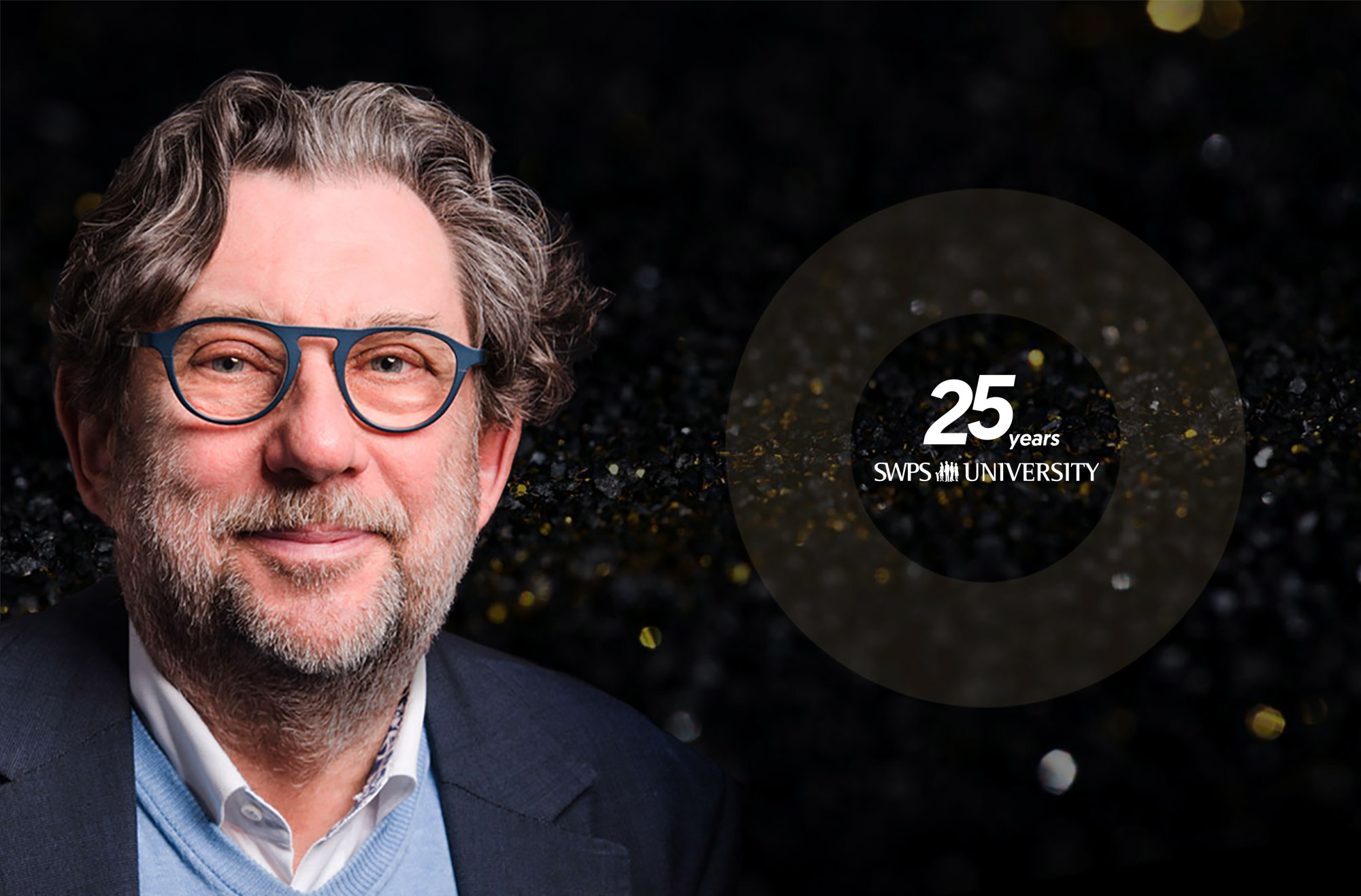Piotr Voelkel, a businessman, art connoisseur, promoter of Polish design, sponsor of multiple cultural and educational projects, and recipient of the Knight’s Cross of the Order of Polonia Restituta for outstanding contributions to the development and promotion of Polish business and for contributions to the community, talks with an editor Karolina Koziołek about continuous efforts of changing the world for the better, constant search for unorthodox solutions, flexibility in action, and readiness for whatever the future brings.
Managing a university
Karolina Koziołek: Currently you hold the statutory position of the Founder of SWPS University. How did it happen?
Piotr Voelkel: Over 13 years ago, I met with the founders of the then Warsaw School of Social Psychology SWPS: Professors Andrzej Eliasz, Janusz Reykowski and Zbigniew Pietrasiński. It transpired that those three acclaimed psychologists do not have successors, who could continue their mission, and they were looking for someone, who could lead the university into the future. It was crucial for them that the person who would take over could guarantee further development of the School and would appreciate the academic potential of the university-to-be. Luckily, we came into an agreement.
Professor Andrzej Eliasz remained the Rector of SWPS University. It was an excellent solution, because his knowledge and experience, which he shared with me, allowed me to get to know the university and prevented me from making serious mistakes. The transfer of the statutory function of the Founder (which is defined in the Polish Law on Higher Education) was happening gradually over a few years of our close cooperation, with an input form Professors Reykowski and Pietrasiński, who supported the process.
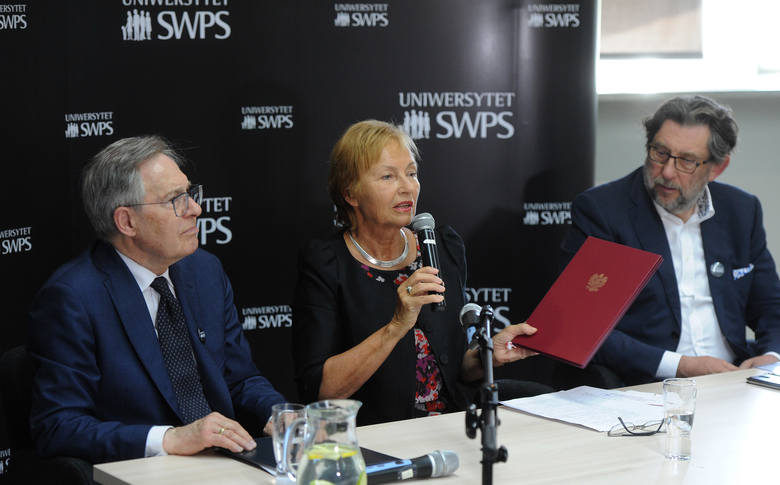
Professor Andrzej Eliasz, Minister of Science and Higher Education (2013-2015) Lena Kolarska-Bobińska and Piotr Voelkel at a press conference on the opening of the first non-public university in Poland
How did it impact your life?
P.V.: Managing an organization, which a university actually is, is very different form managing a business. You have to convince the whole staff to implement certain decisions. A university is not a company where you can just give orders. SWPS University will follow in a given direction on the condition that most employees agree that a certain course of action makes sense. Therefore, I had to learn about and take into consideration many dependencies and complications that are specific to this community, in order to impact changes as a partner, in cooperation with the Executive of the University.
Nowadays, together with Rector Roman Cieślak and Director General Ewa Ger, we work very efficiently. We trust, respect and like each other. We set similar goals for the University. We know how we want to change it in the face of threats that that the environment and the future carry. We know that the University may serve as Noah’s Ark for us, a vessel that protects students and staff from the polluted waters surrounding the Ark.
How do you see the development of SWPS University? What challenges is the university facing?
P.V.: Without a doubt, preparing young people for the situation that will come in the future is an extremely difficult task. After all, the people we admit to the university today, will graduate in five years. Taking into consideration the pace of changes that are undergoing in the world – and we are on the verge of huge revolutions – our graduates most likely will have to work in a completely different world than the one we know now.
The key to success is an ability to work in a multidisciplinary team, an ability to talk with experts representing different disciplines, an ability to step out of one’s own experiences and search for people who see the world differently – this is the only chance for effective functioning in a rapidly changing world. We cannot afford to be specialists tightly closed in our own silos. We must be open and flexible, but mostly, we must be brave, because fear closes us off to others and to changes. Unfortunately, Polish schools, and often Polish families, motivate children by ramping up fear. Idealists, those who dare “to bite more than they can chew”, are ridiculed. I think that this is one of the stupidest Polish sayings. You must try, because this is the only way to discover your own path and a faster way upwards. As we know, everyone wants to get to the top.
But there is so little room at the top. How are we all going to fit there?
P.V.: Just because this is the goal, does not mean that we all will get there at the same time.
This means that some of us will get stuck on the way there...
P.V.: The clue of the matter is to go higher, change an orbit.
Courage in searching for new solutions
How did it happen that School of Form, a design program, was established at a university with a social sciences and humanities profile?
P.V.: I owned various companies, including VOX Meble and VOX Profile, I wanted to create my own original products. For this purpose, I was looking for designers and it was not easy, because graduates of the Academy of Fine Arts (ASP) wanted to created works of art, that is innovative and unique objects, but often impractical, not suitable for mass production. I struggled with these complications. Specialists who were educated in Poland did not always know how to design products for the market. Of course, along the way, I met designers who had already perceived their role differently than just through an artistic lens. I began thinking about founding a faculty of design that would prepare students for thinking about the needs of users; students able to communicate with the industry. I knew that with this type of design thinking Polish companies would be able to develop their own unique, one-of-a-kind offer, and promote their own brands around the world.
At the time, I visited different shows and fairs, and in Eindhoven, I met Zuza Skalska, a trend analyst specializing in design, business and innovation, and then she introduced me to Lidewij Edelkoort, the world famous trend forecaster. Together, we began considering opening a higher education institution in Poznań. However, Lidewij Edelkoort had one condition: the school should not be a copy of the Design Academy in Eindhoven, where she held the position of the Director at the time. She was of the opinion that we should go one step further and build a new education model, which would meet market needs of that time.
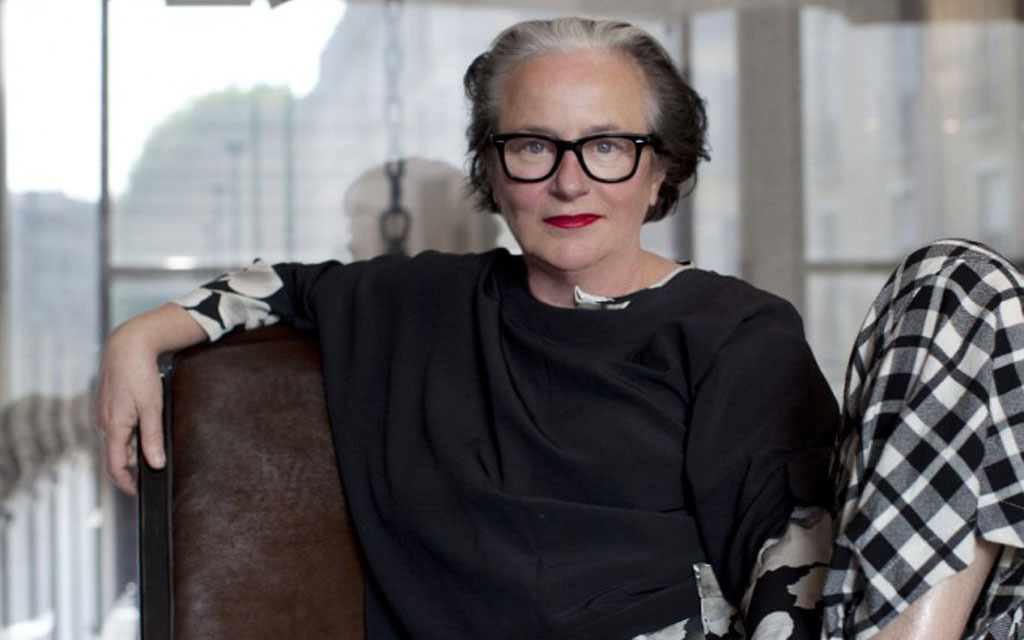
Lidewij Edelkoort - co-founder of School of Form, world renowned trend forecaster, listed by the Time's magazine among the top 25 most influential people in the fashion industry and ranked by Icon among the top 40 most influential individuals in the design industry
Our deliberations, discussions and talks took three years until we jointly discovered that we actually already had the basis for a Design Academy in Poland in the form of SWPS University, which educated psychologists, political scientists, sociologists, philosophers and anthropologists, and contemporary designers must start with understanding people. Only the knowledge of areas where people get stuck due to a lack of suitable products can provide a starting point for design. Starting with this assumption, we developed the proposal of School of Form.
So the idea to combine design with humanities came from Lidewij Edelkoort?
P.V.: Yes, to be honest, she brought this idea as she decided that this was the key to the essence of design. Designers must be knowledgeable about sociology, philosophy, anthropology, and they must search for knowledge about people, either in handbooks or by observing people. We also had to confront these designers with technology, so we established various workshops, so that they could understand complications arising from technical limitations.
School of Form is an extremely important project on a global scale. Delegations from various other universities in Europe, Israel, and the United States visited us to see how School of Form works, and many began to copy this model as they regarded it to be cutting-edge and effective.
Lidewij was thrilled with the freshness of ideas coming from our students. Many of our graduates went on to successful careers in international corporations, some established their own companies. I believe that Polish industry was given a chance to manufacture its own original products, designed by Polish designers.
I think that in the context of School of Form we can talk about your courage in not shying away from challenges and looking for unorthodox solutions. My next question is about courage, but understood more broadly. Can a university be brave in Poland? How do you imagine a university of the future will look like?
P.V.: The strategy of SWPS University includes three key words: courage, responsibility, and openness. We interpret the courage in various ways. Firstly, the goal is to provide students with knowledge and competencies, support them so that they are not afraid of the outside world and of what the future brings. We teach them team work. In case of School of Form, we provide them with technical skills, manual and manufacturing abilities, because we believe that “I am able to” gives more courage and self-confidence than “I know”. We want to educate students in a way which ensures that they are able to face the surrounding world and are not afraid of the upcoming changes.
Our courage also manifests in the constant alignment of our study programs to all subsequent challenges of the contemporary world. We continually modify our programs and submit proposals of new ones. We venture into completely new territories, such as management or computer science, and we keep thinking about other changes.
Computer science seen from a very unusual perspective...
P.V.: Nowadays, applications are a domain of computer scientists and economists, who focus on the optimization of programs and financial results, while forgetting about people and their needs. Sometimes they go further, in other words, they want users to form an addiction to the application to collect as much information about the user as possible, and then to sell this knowledge to other service providers.
Computer science that we have in mind is closely related to psychology and humanities. We want to educate students, who will be able to define a problem from the perspective of people and their needs. To support and protect people, instead of addicting and cornering them.
Responsibility for the local community
SWPS University is the first non-public university in Poland. There is no other private higher education institution in the country that could boast this title. What is the role of the fist non-public university in the society?
P.V.: To achieve a university status, a higher education institution must fulfill specifically defined requirements, in many disciplines, resulting form the activities of the research community. We have been granted a university status only because we highly value researchers and we provide them with a suitable space for research. Furthermore, we invite students to enter this scientific community. Consequently, numerous former students are now our professors. SWPS University was founded by acclaimed professors from the Polish Academy of Sciences (PAN), but nowadays, we have our own academic staff – many students stay here and conduct research, many of our young professors graduated form our university.
At the same time, as a non-public university, which operates thanks to tuition fees, we remember that the education process and the quality of education are extremely important. So SWPS University stands on two pillars. The first pillar: science and research, and also European reputation in this area. The second pillar: an utmost attention and care extended towards our students and their futures. We do everything in our power to ensure that students feel comfortable at SWPS University and know that they can learn a lot here and can count on our help. We have also been building a third pillar. We want to be needed by and be useful for the Polish business and the society. We want to share our knowledge with companies, public administration offices, and NGOs. We want to support them through training, consultations and specialized research. We have already started working in this area and the potential for cooperation is huge.
You have already talked about values. I would like to ask about the next value that SWPS University adheres to: responsibility. How does it manifest?
P.V.: Firstly, responsibility for our students and their professional futures. We put much effort into observing students during their studies and into supporting them the best way we can, so that the students could peak and go further in the right direction.
Secondly, responsibility for our country and the world we live in. We think that as a university we must try to influence the direction in which our environment is changing, ensuring that it is changing for the better, a country of brave people, open towards others who love freedom and who appreciate that we have achieved so much post 1989. We want to be the source of truth that, like clean water, ensures a healthy social debate, supports democracy, and brings freedom.
Somewhere alongside, there is also a wish to show students the value of art. I think that artists provide good examples for young people, because they are living proofs that by drawing on one’s own curiosity and using one’s own abilities, you can do crazy things and make your dreams come true. Therefore, I do everything I can to provide students with opportunities to meet artists and experience works of art. We feel responsible for opening their eyes to art and opening their hearts to inspirations from this beautiful, colorful, and interesting world. I, myself, owe a lot to cooperation with artists.
SWPS University is offering various services to different segments of the population – it runs a Cognitive-Behavioral Therapy Clinic in Warsaw and a Community Center for Child and Youth Mental Health in Poznań.
P.V.: Yes, we help children, teenagers, and adults in coping with mental disorders caused by life obstacles, which have multiplied even more during the pandemic. We are also ready to support medical professionals in the difficult situation they found themselves in.
In the future, there will be many more of these clinics. We would like to establish SWPS University clinics in every city, although nowadays, when so many services moved online, we can provide services all over the country. I know how psychologists and psychotherapists may improve the quality of life and health. On the other hand, we want to not only educate psychologists, but also show their usefulness, and what is more important, create jobs for them.
We are also open to collaboration with business. SWPS University is a very useful partner for organizations, because we are able to solve many problems that companies face. We show organizations the significance of emotions and people in business. We support businesses, train employees, conduct client surveys, help to understand and change organizational culture, help to restructure organizations, develop new strategies as well as discover and develop hidden potential, which may guarantee the success of the strategy.
Openness and perseverance in action
There is only one more value to talk about – openness, which is enshrined in SWPS University’s mission. What does it mean that openness is one of the University’s values.
P.V.: There are many examples of openness. The key assumption for us is to be, as a community, open to international exchange. It refers to students from different countries and lecturers from different regions of the world. We also want to be a multidisciplinary university. We do everything we can to ensure that SWPS University is not a set of silos: lawyers, designers, psychologists, sociologists, and political scientists. We try to develop interdisciplinary projects and interdisciplinary study programs to introduce psychology, which is our most robust discipline in terms of research and teaching, to other disciplines. For example, to computer studies, where human-centered knowledge is needed to understand for whom and for what purpose we design the whole digital reality.
We have introduced elements of psychology to management because we want to equip future managers with knowledge derived form humanities. In the real world, a future head of a company will not manage Excel sheets and economic parameters, but people. Especially, that we are following the example of professor Jerzy Hausner and the concept of Firma-Idea, i.e. a company that exists for the purpose of values that are more important than profit, and where profit is only a tool for achieving higher goals.
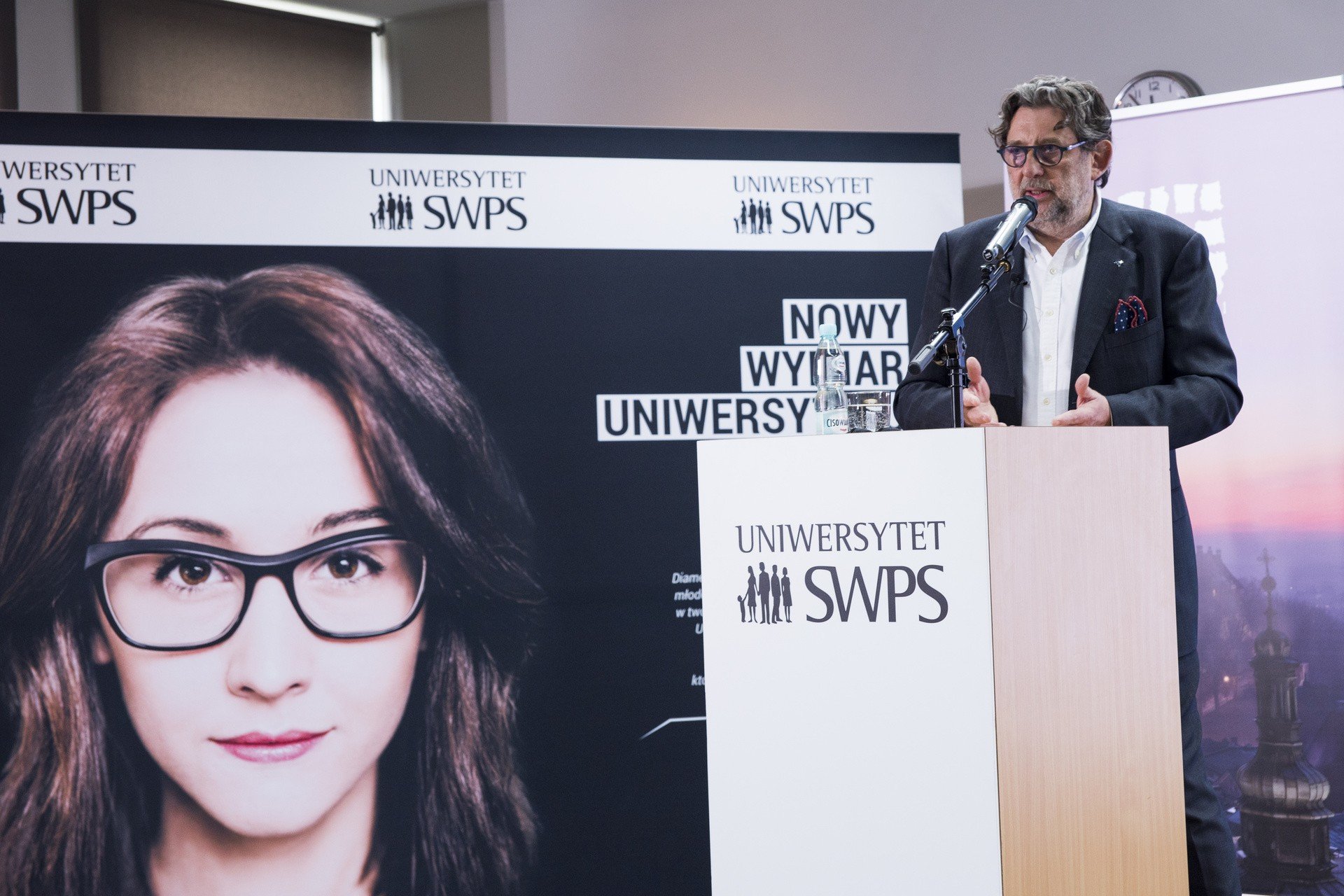
Piotr Voelkel speaking at the "Firma-Idea: management - people - values" seminar (SWPS University, Warsaw, April 26, 2017)
Similarly in School of Form, where human-centered knowledge is a starting point for design and thinking about products and services. At School of Ideas, on the other hand, we would like the knowledge about human beings, and the whole humanities and culture-based education, help graduates to design good relationships and services.
What do you dream about these days? As a businessman, investor, patron of the arts and, at the same time, someone who has his feet firmly on the ground.
P.V.: My dreams oscillate around two areas. The first one is my family. Firstly, I want to maintain good relationships with my children and grandchildren, and be able to cheer them along the way of their development. Watching them makes me very happy because they are wonderful kids, and I love spending time together with them in the country. This dream is partially coming true, and there is still hope that it can be developed further, be better and expand more.
The second area relates to business projects. Every so often, I manage to implement projects in education, art, and the construction industry, which get some attention around the world, receive some acclaim, and garner awards and recognition. I am glad that I have a wonderful team, with whom we can undertake such unique and important initiatives. I am happy that we do things, which we can be product of, and I hope that it will be a pleasure to see these objects receive positive feedback from an international community in the future. Nowadays, I have a luxury of doing what I want, what inspires me, with partners that I like and value.
Has the pandemic changed your outlook on life and work?
P.V.: Experiences of the last year made me reflect on many things. I have discovered that it is possible to live differently, and that it is a happy life. First of all, I have understood that my previous plan, my idea to, no matter what, reverse the flow of a river that has been running in a direction opposite to what I had planned, was very costly, both emotionally and energy wise. Of course, sometimes it would bring spectacular wins, but at a high cost in the form of many difficult situations, conflicts and anger. I have discovered that it does not make sense, that it is much better to go with the flow, and when you are approaching a waterfall, hold on harder to the ores. If I fall out of a kayak, there will always be someone who will throw me a life buoy.
The second important thing that I have discovered is the fact that you can never make everyone happy. I have learned that thanks to Bałtyk, a building that we built in Poznań, a building which some people regard as a piece of art, recognized with awards in international competitions, while others think it is an eyesore that spoils the Poznań cityscape. It is one and the same building, but opinions are extremely diverse. Translating this into my own life, I have realized that you should not be concerned at all about what other people think of you, because their assessments of you have nothing to do with you, instead they rather result from those people’s own experiences. It is mostly visible in their reactions to your mistakes. All those that like and appreciate you, gladly lend a hand. Others, who compete with you or wish you all the worst, will do anything to take advantage of the situation to hurt or humiliate you. Understanding these mechanisms allows you to pay less attention to hostile or critical comments of the prejudiced, and it simply makes it easier for you to be happy.
Thank you for the conversation.

Piotr Voelkel
co-founded the VOX Capital Group, which includes companies operating in the construction, interior design, and furniture design sector. He also co-founded Concordia Design, a design center in Poznań, and the VOX-ARTIS Foundation for the Promotion of Polish Contemporary Art. Moreover, Piotr Voelkel is the President of Wielkopolskie Towarzystwo Zachęty Sztuk Pięknych [The Greater Poland Society of Zachęta National Gallery of Art], whose collection is included in the permanent exhibit at the National Museum in Poznań. To support young talents, Mr. Voelkel established the “Talenty” scholarship.
In 2008, Piotr Voelkel was appointed the President of the Institute for the Development of Education, which took over the statutory role of the Founder of SWPS University. Together with Lidewij Edelkoort, a former Chair of the Design Academy, Eindhoven, in the Netherlands, Piotr Voelkel, under the auspices of SWPS University, founded School of Form, an innovative design program that combines humanities and design education. The program was recognized by the Ministry of Science and Higher Education for its unique approach to design teaching. Additionally, Piotr Voelkel co-founded Collegium Da Vinci, a higher education institution offering degree programs in Arts and Engineering (IT) in Poznań as well as the Da Vinci Education Group that includes primary, middle and secondary schools.
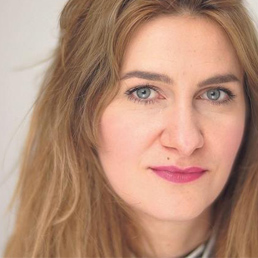
Karolina Koziołek
graduated from the Adam Mickiewicz University in Poznań with a degree in cultural studies. Over the years, she held various positions including a literary secretary at the Tadeusz Łomnicki Nowy Theatre in Poznań and a journalist at Głos Wielkopolski, the main daily newspaper in western Poland, where she conducted dozens of interviews. Currently, she is the President of VOX-Artis Foundation for the Promotion of Polish Contemporary Art.
back to the 25th jubilee page →
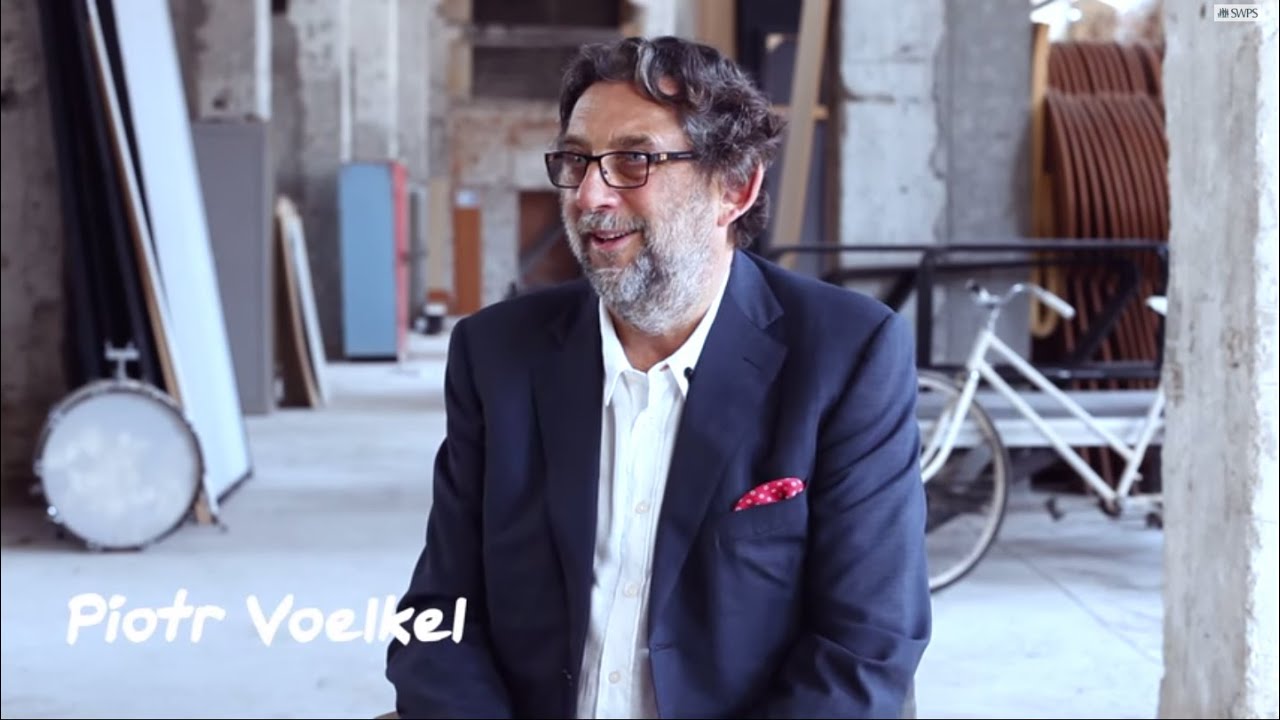
Piotr Voelkel – Visionary of Polish Business
Piotr Voelkel, winner of the Wizonerzy 2016 (Visionaries 2016) award that recognizes individuals who demonstrate vision, determination and courage in pursuit and implementation of meaningful projects, despite difficult market conditions.

